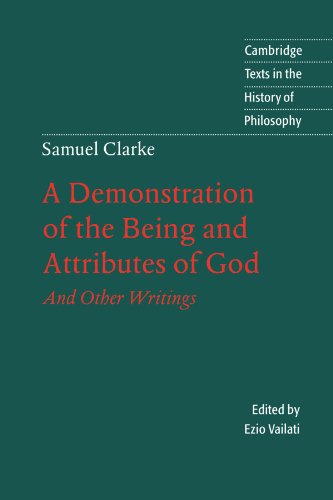Background
Clarke was born on October 11, 1675, in Norwich, England, the son of Edward Clarke, an alderman of Norwich, and Hannah Clarke.

Kings House, Surrey St, Norwich NR1 3NX, UK
Clarke attended the Free School Norwich.
Trinity St, Cambridge CB2 1TA, UK
Clarke entered Gonville and Caius College, Cambridge, in 1690.

(A Demonstration of the Being and Attributes of God was pu...)
A Demonstration of the Being and Attributes of God was published in 1705 and is one of the most famous attempts at proving the existence of God. It is a very clear exposition of the Cosmological Argument, which seeks to show that the existence of the world necessarily entails that of its maker. This volume presents it together with some important supplementary texts, and with a historical introduction that examines Clarke's views and relates them to the Newtonian circle of which he was the most gifted and influential representative.
http://www.amazon.com/gp/product/0521599954/?tag=2022091-20
1705

(Precious Bible Promises brings together select passages o...)
Precious Bible Promises brings together select passages of the Bible with the succinct analysis of preacher, scholar, and doctor of divinity Samuel Clarke. A classic text for Bible study and a perfect introduction to the lessons of the Bible for the uninitiated, Precious Bible Promises contains hundreds of quotations which inspire faith. Designed as a handbook to help with life's myriad trials and troubles, this book is certain to provide peace of mind and comfort with any problems to surface.
http://www.amazon.com/gp/product/1543162789/?tag=2022091-20
philosopher scientist theologian
Clarke was born on October 11, 1675, in Norwich, England, the son of Edward Clarke, an alderman of Norwich, and Hannah Clarke.
Clarke attended the Free School Norwich and entered Gonville and Caius College, Cambridge, in 1690. He became a scholar of his college in 1691 and received the Bachelor of Arts degree in 1695. His major interests were physics and theology, and he mastered the contents of Sir Isaac Newton’s Principia while at Gonville and Caius. He was elected a fellow of the college in 1696 and retained the office until 1700.
In 1697 Clarke made a Latin translation of Jacques Rohault's popular physics textbook “Traité de physique”, adding numerous footnotes explaining Newton’s improvements on Rohault’s work. The translation was used as a textbook at Cambridge until after 1730.
He succeeded William Whiston as chaplain to Bishop Moore of Norwich in 1698 and was presented with the living of Drayton, near Norwich. The following year he published “Three Practical Essays, on Baptism, Confirmation, and Repentance.”
In 1704-1705 he gave two sets of lectures, published as “A Demonstration of the Being and Attributes of God” (1705) and “A Discourse Concerning the Unchangeable Obligations of Natural Religion” (1706), which brought him immediate recognition. In 1706 he translated Newton's Optics into Latin. Newton was so satisfied with Clarke’s “pure and intelligible Latin” that he paid him £500. In the same year, Clarke was appointed to the rectory of St. Benet’s in London, was introduced to Queen Anne, and was made one of her chaplains-in-ordinary.
In 1709 he became rector of St. James, Westminster, and he held this position until his death, despite the charges of heresy provoked by his “Scripture Doctrine of the Trinity” (1712), which led many of his opponents to accuse him of Arianism. This Unitarian work led to a long pamphlet war with such orthodox divines as Daniel Waterland and to a complaint being made about it by the Lower House of Convocation in 1714. Clarke succeeded in defending himself before the Upper House and was not censured. He did, however, agree to write and preach nothing further on this topic, a course of action of which the more outspoken Arians did not wholly approve.
In 1715-1716 Clarke corresponded with Gottfried Wilhelm Leibniz on the nature of time and space, claiming that as attributes of God they had a real, rather than an imaginary, existence. In the controversy with Leibniz, Clarke supported Newton's theory of absolute space and time. Their correspondence, important for its defense of the reality of space and time, appeared in print in 1717.
(Precious Bible Promises brings together select passages o...)
(A Demonstration of the Being and Attributes of God was pu...)
1705Clarke argued against materialism and atheism and for free will and the immortality and spirituality of the soul. He opposed the skepticism of Locke and the materialists, and was a forerunner of English deism, though he satisfied neither the deists nor the orthodox divines.
Clarke married Katherine, the daughter of the Reverend Mr. Lockwood of Little Massingham, Norfolk. They had seven children, of whom five survived.
